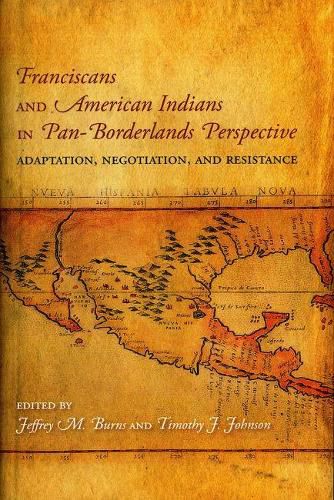Readings Newsletter
Become a Readings Member to make your shopping experience even easier.
Sign in or sign up for free!
You’re not far away from qualifying for FREE standard shipping within Australia
You’ve qualified for FREE standard shipping within Australia
The cart is loading…






Founded in 1565, St. Augustine was the multicultural, and often embattled, outpost of the Spanish empire. St. Augustine’s economic, political, and religious power was reflected in other towns and villages that stretched across the continent from the Atlantic to the Pacific oceans. Scholars frequently refer to this broad swath of territories as the
Spanish Borderlands.
Of those who accompanied the Spanish to these lands, it was members of the Franciscan Order who, as missionaries, had the most direct contact and interaction with the diverse populations of American Indians.
As the 450th anniversary of the founding of St. Augustine drew near, scholars from the Americas and Europe gathered on Mar 13-15, 2014, for the conference,
Franciscan Florida in Pan-Borderlands Perspective: Adaptation, Negotiation, and Resistance
at Flagler College in St. Augustine. The expressed intent of the gathering was, as David Hurst Thomas writes in the Introduction, to
address issues of acculturation, political and economic relations, religious conversions, and the nature of multiethnic relationships across the Spanish Borderlands.
The result is a rich collection of essays from anthropologists, archaeologists, linguists, historians, and theologians. Diverse contributions of the Navajo, Hopi, and California tribal members in attendance was a reminder of the complexity of the thematic and an on-going challenge to continue research into new, and yet unexplored territories.
$9.00 standard shipping within Australia
FREE standard shipping within Australia for orders over $100.00
Express & International shipping calculated at checkout
Founded in 1565, St. Augustine was the multicultural, and often embattled, outpost of the Spanish empire. St. Augustine’s economic, political, and religious power was reflected in other towns and villages that stretched across the continent from the Atlantic to the Pacific oceans. Scholars frequently refer to this broad swath of territories as the
Spanish Borderlands.
Of those who accompanied the Spanish to these lands, it was members of the Franciscan Order who, as missionaries, had the most direct contact and interaction with the diverse populations of American Indians.
As the 450th anniversary of the founding of St. Augustine drew near, scholars from the Americas and Europe gathered on Mar 13-15, 2014, for the conference,
Franciscan Florida in Pan-Borderlands Perspective: Adaptation, Negotiation, and Resistance
at Flagler College in St. Augustine. The expressed intent of the gathering was, as David Hurst Thomas writes in the Introduction, to
address issues of acculturation, political and economic relations, religious conversions, and the nature of multiethnic relationships across the Spanish Borderlands.
The result is a rich collection of essays from anthropologists, archaeologists, linguists, historians, and theologians. Diverse contributions of the Navajo, Hopi, and California tribal members in attendance was a reminder of the complexity of the thematic and an on-going challenge to continue research into new, and yet unexplored territories.